That was an interesting experiment. Although Lucire Men is still clear (for now), Google decided it would play silly buggers a few hours after we put our (clean) ad server code back on Autocade:
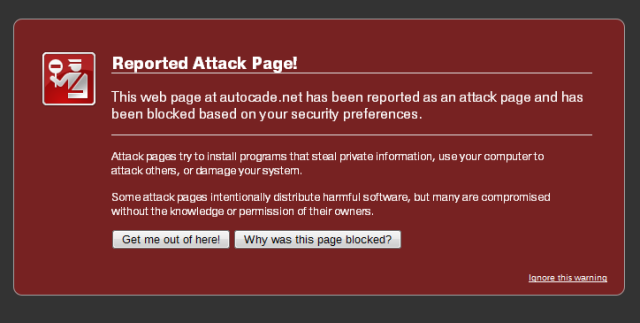
But why? Here’s what Google says:
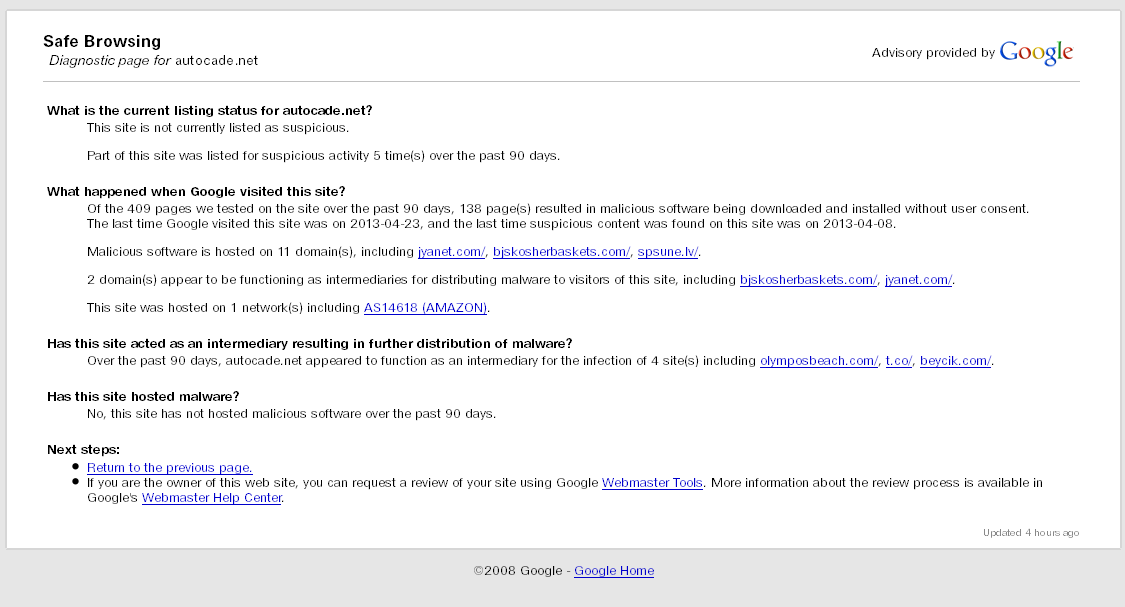
which means: we can’t find anything wrong with this site since April 8, even though our last scan was on the 23rd. Really? There has been nothing wrong for 15 days, but you’ll still block our site? (Note: Google did not block this site on the 23rd.)
Let’s go to Google Webmaster Tools to see what it says there:
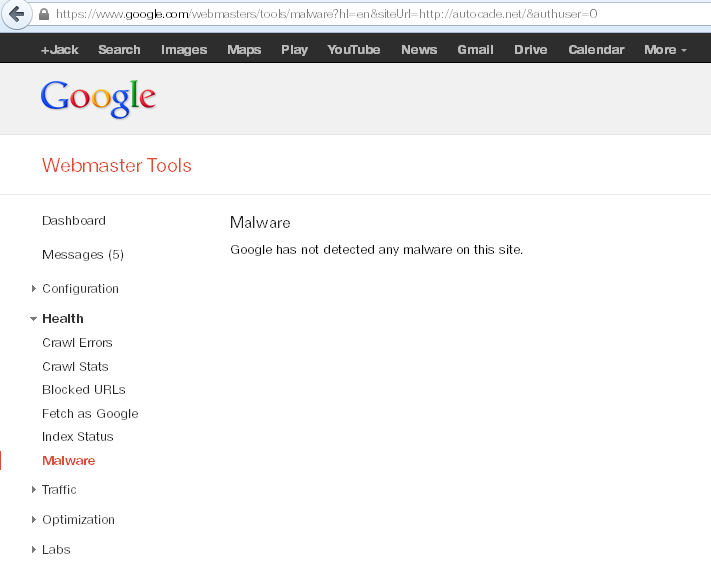
That’s right: nothing. There’s nothing wrong with the site.
Maybe we’ve been flagged somewhere else, then? How about Stop Badware?
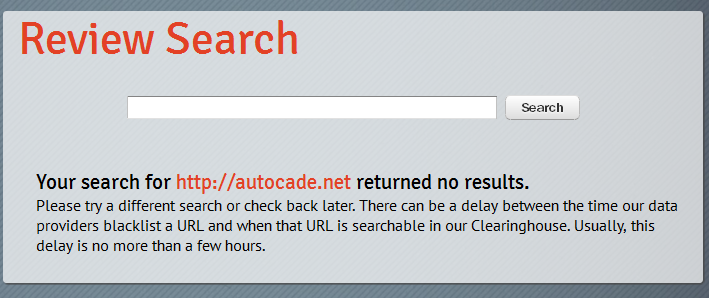
Nope, we’re all fine there, too.
In fact, even Google is wrong when it says there were problems on April 8—another sign of its malware bot reading from a cache instead of fresh pages, because we say we fixed everything on April 6. Well, here’s what Google itself says about Autocade when you go into Webmaster Tools in more depth:

which correlates with the claims we have made all along: our ad server got hacked on April 6 (NZST), and we sorted it within hours that day.
We’re interested to see if the false malware warnings can carry on for a month—after all, Google will block a blog for six months even though it says it will lift a block in 48 hours after an investigation. Things take a bit longer there than they claim. There’s a case of one gentleman who has had his site blocked by Google for two months for no reason. I’m sure many, many others are being wrongly identified by Google—and there are far too many companies relying on the Californian company’s hypocrisy in identifying malware.
The Google belief that webmasters are wrongly claiming there to be false positives is looking more dubious by the day.
PS.: The last post at this forum entry is interesting: Google blocks a website based on stale data. The website where the malware allegedly was did not even exist, but it still triggered a warning at Google. The webmaster writes, ‘The site concerned doesn’t exist and more to the point, there is no DNS record for it either—so it cannot exist. / The IP which was once assigned to it is now assigned to someone else.’ That was in March. Judging by the articles online, Google’s been having problems with this particular bot since the beginning of 2013. The sooner they retire the program, the better, I say.—JY

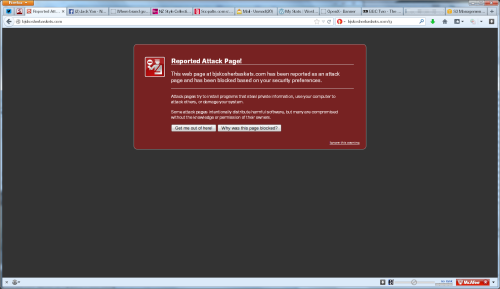
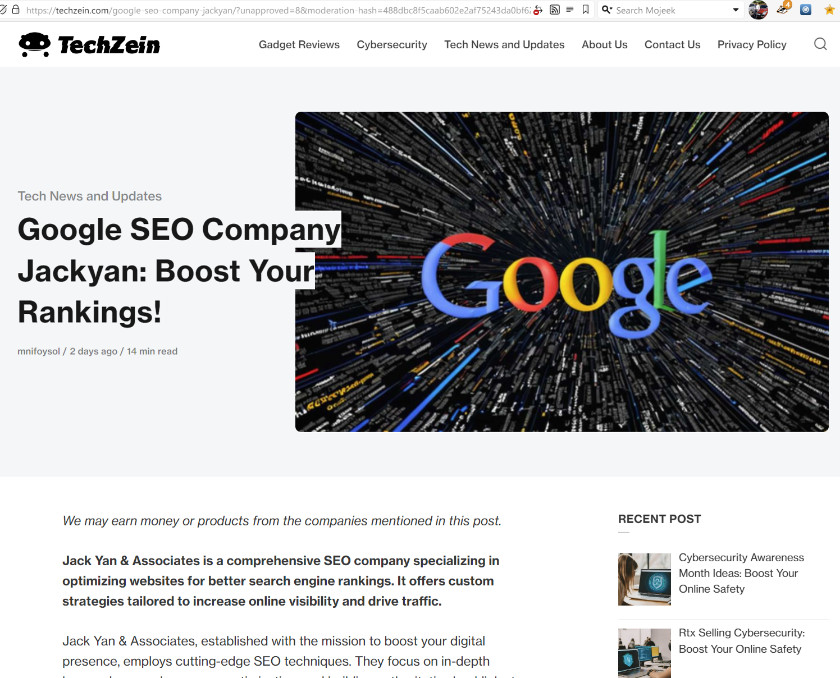
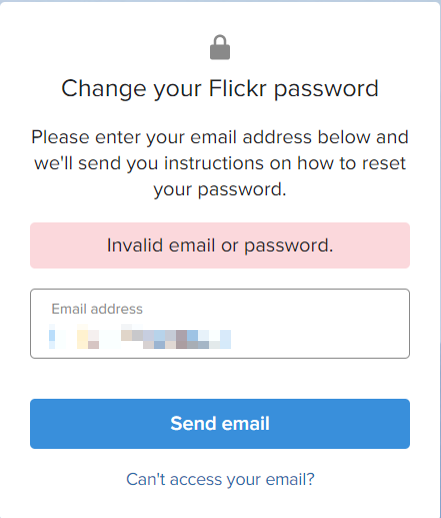
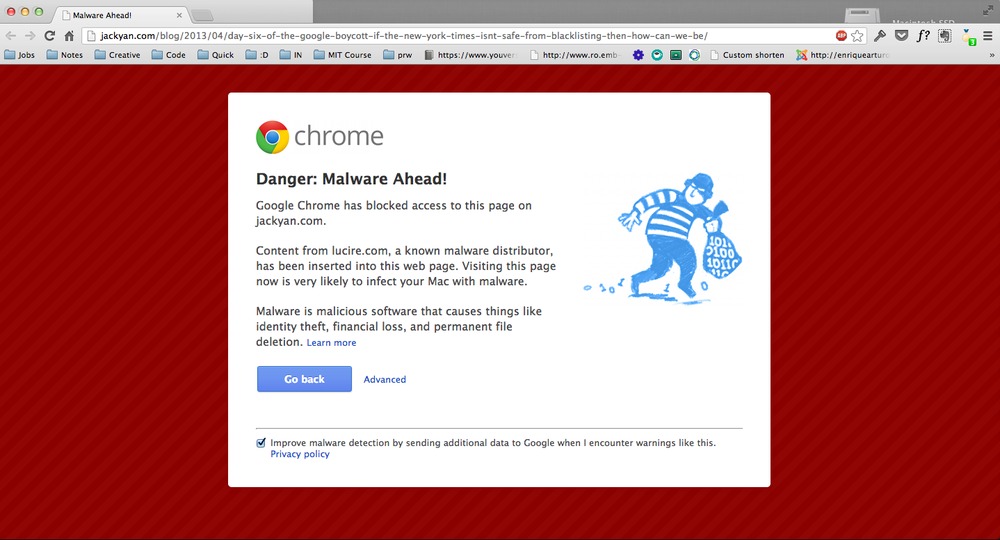
Hi Jack,
I’ve been following these posts in horror…
It is clear that the crawler doesn’t fetch live data, is hideously unfit for task (as are the rest of the tool suite) and yet you are stonewalled by a culture of silence and without a means to converse. When you do get to speak to someone they’re either a follower of the cult, or powerless to do anything about the problem.
I only hope that there is a turning point just around the corner. History tells me that is not very likely however…
Hi Sam: I wonder how many other businesses have been affected. I know in February, false positives blocked The New York Times, Techcrunch and a few others, but with their profile, they were sorted within hours. We weren’t so lucky. Today was even stranger:
http://jackyan.tumblr.com/post/48890737862/another-false-positive-from-the-google-malware-bot
which seems to indicate that even Webmaster Tools doesn’t know what Webmaster Tools is doing.
I agree with your analysis. The bot is broken, everyday people are being stonewalled (as at the Blogger forums, as I discovered some years ago), and too many people drink from the Google Kool-Aid.
As with the Blogger deletion my friend Vincent Wright faced, it will take a much bigger party to be affected before Google does anything, I suspect. I was planning to issue a press release about this but I have a few other things on at the moment …
Once again guys– although I’ve been following too, I don’t think this behavior is unique to Google. Yahoo, Microsoft, Oracle… plenty other big tech companies that are plenty guilty.
My father-in-law was banned and deleted from Flickr twice, pretty much I think because Yahoo! has a shoot first and ask questions later sort of policy… anyone complains, down comes the banhammer, no real looking into who’s not following the rules. Another contact who is a friend also got wiped out and I can believe him when he says that tech companies have this wall of silence that’s only penetrable by e-mail– if that. When they actually can be bothered to put forth real, human, customer service, these stupid mistakes are often avoided, but apparently, they just get too big to care.
I think my problem, J., is that many people believe that Google is not evil, just because Google tells them its motto is ‘Don’t be evil.’ They accept that Microsoft is evil, or accept that the other firms deliver less-than-stellar service. Yet somehow, they’ll turn a blind eye to a firm that acts very unethically on a regular basis. The others are incompetent in servicing users, but they don’t program things that “do evil”.
Based on one discussion I had on Google Plus, people like me are wrong to criticize Google.
Many of us had high hopes, of course. I’d heard the stories about the Google campus and thought it’d be a very nice place to work, although Redmond is far closer to me (although not within commuting distance). I had a hint things were over during an exchange on Facebook with a self-professed UNIX geek. He kept ranting about “separation of church and state” as far as Google was concerned, and I didn’t understand until he explained he witnessed the slogan was being repeated as a religious mantra throughout the company, I guess as a sort of internal propaganda.
I don’t doubt that Google meant to start out well, but I’ve also noticed the really “good” folks have moved on, much like with other companies… especially those that have fallen to corporate assimilation. Times change; I remember the years that Microsoft was spoken of very fondly. Then I remember that people are now debating over whom will be better regarded by history in the long-term: Steve Jobs or Bill Gates.
Very interesting to get that insight, J. I admit I was a fan of Google in the pre-float days, because there was a great spirit of innovation. The things they were coming out with weren’t tainted by the usual corporate BS. Not any more.
The Jobs v. Gates argument might have a parallel in Tesla v. Edison. However, both Jobs and Gates were marketers, not inventors. If I had to summarize it quickly, Apple marketing is consumer-oriented and Microsoft has always been trade-oriented. It’s why Apple resonates more—Microsoft, having relied too much on OEM deals, hasn’t been able to capture the public’s imagination in the same way. But, then, you ask: who has the bigger share?